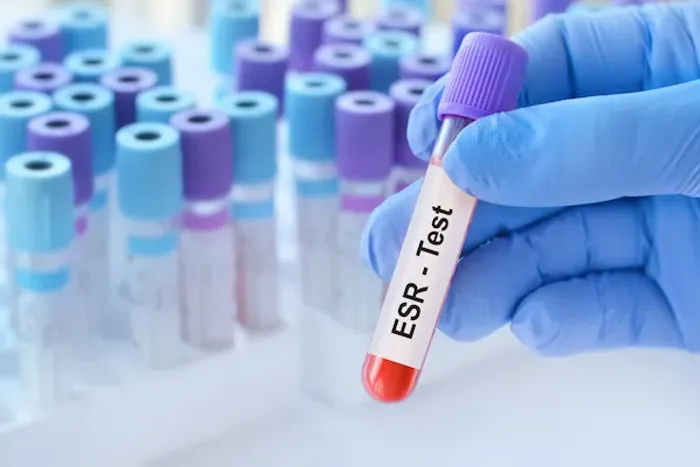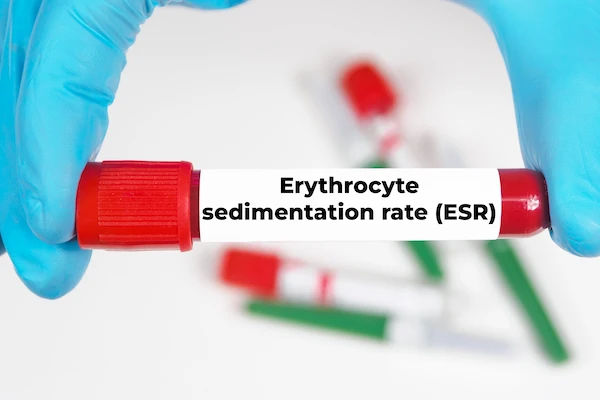ESR Test Overview and Interpretation
Learn about the Erythrocyte Sedimentation Rate (ESR) test, its purpose, procedure, and how to interpret the results. Discover how it helps detect inflammation and monitor various health conditions.


ESR Test Overview and Interpretation
When you visit a doctor with symptoms like unexplained fever, joint pain, or fatigue, they may recommend an ESR (Erythrocyte Sedimentation Rate) test. This simple blood test helps detect inflammation in your body, which can be a sign of various health conditions.
If you’ve been asked to take an ESR test or have received your results, you might wonder what it means. Don’t worry—this article will explain everything in simple terms, from why the test is done to how you can interpret the results.
What Is an ESR Test?
The ESR test measures how quickly red blood cells (erythrocytes) settle at the bottom of a test tube in one hour. When there’s inflammation in your body, certain proteins make the red blood cells clump together and sink faster. A higher ESR indicates more inflammation.
Why Is the ESR Test Done?
Doctors use the ESR test to:
- Detect inflammation linked to infections, autoimmune diseases, or cancers.
- Monitor conditions like rheumatoid arthritis, lupus, or temporal arteritis.
- Check if ongoing treatments (like for infections or autoimmune disorders) are working.
However, the ESR test alone doesn’t diagnose a specific disease—it only signals that something might be wrong. Further tests are usually needed to find the exact cause.
Consult a Top Immunologist
What Do ESR Test Results Mean?
ESR levels vary by age and gender. Generally:
- Normal ESR for men under 50: 0–15 mm/hr
- Normal ESR for women under 50: 0–20 mm/hr
- Normal ESR for men over 50: 0–20 mm/hr
- Normal ESR for women over 50: 0–30 mm/hr
High ESR Levels
A high ESR suggests inflammation, which could be due to:
- Infections (bacterial or viral)
- Autoimmune diseases (rheumatoid arthritis, lupus)
- Chronic conditions (kidney disease, thyroid disorders)
- Cancers (lymphoma, multiple myeloma)
- Tissue injury or trauma
Low ESR Levels
A low ESR is usually not a concern but may be seen in conditions like:
- Polycythemia (too many red blood cells)
- Sickle cell anemia
- Heart failure
What Can Affect ESR Results?
Certain factors can raise or lower ESR without indicating a serious problem:
- Pregnancy (higher ESR)
- Old age (naturally higher ESR)
- Anemia (faster ESR)
- Medications (steroids, NSAIDs, or birth control pills can alter results)
If your ESR is abnormal, your doctor may order more tests (like CRP, ANA, or imaging) to find the exact cause.
How Can You Manage High ESR?
Since high ESR indicates inflammation, managing the underlying condition is key. Here are some general tips:
1. Follow Your Doctor’s Advice
- If an infection is causing high ESR, antibiotics or antivirals may help.
- For autoimmune diseases, anti-inflammatory medications or immunosuppressants may be prescribed.
2. Adopt an Anti-Inflammatory Diet
- Eat more: Fruits, vegetables, nuts, fatty fish (rich in omega-3), and whole grains.
- Avoid: Processed foods, sugary drinks, and excessive red meat.
3. Stay Active
Gentle exercises like walking, yoga, or swimming can help reduce inflammation.
4. Get Enough Rest
Chronic stress and poor sleep can worsen inflammation. Aim for 7–8 hours of sleep daily.
5. Quit Smoking & Limit Alcohol
Both smoking and excessive alcohol increase inflammation in the body.
When Should You See a Doctor?
If you experience symptoms like:
- Persistent fever or fatigue
- Unexplained weight loss
- Severe joint pain or stiffness
- Chronic headaches
…then an ESR test can help identify if inflammation is the cause.
Need to get tested? You can easily book an ESR test or consult a specialist through Apollo 24|7. Early detection helps in better management of health conditions.
Final Thoughts
The ESR test is a useful tool to detect inflammation, but it’s not a standalone diagnostic test. If your results are abnormal, don’t panic, work with your doctor to find the root cause and follow a healthy lifestyle to manage inflammation.
Consult a Top Immunologist
Consult a Top Immunologist

Dr Bharath Kumar S
Cardiologist
5 Years • MBBS MD DrNB ( Cardiology )
Bengaluru
PRESTIGE SHANTHINIKETAN - SOCIETY CLINIC, Bengaluru

Dr. Anshu Sethi
Paediatrician
33 Years • MBBS, MD, DM (Paediatrics & Neonatology)
Pune
Apollo Clinic, Viman Nagar, Pune
(75+ Patients)

Dr Yaja Jebaying
Paediatric Gastroenterologist
9 Years • MBBS, MD PEDIATRICS, FELLOWSHIP PEDIATRIC GASTROENTEROLOGY AND HEPATOLOGY AND LIVER TRANSPLANTATION
Delhi
Apollo Hospitals Indraprastha, Delhi
(25+ Patients)

Dr. Rohit Vohra
Paediatric Pulmonologist
10 Years • MBBS, MD PEDIATRICS, FELLOWSHIP IN PEDIATRIC INTENSIVE CARE,FELLOWSHIP IN PULMONOLOGY
Delhi
Apollo Hospitals Indraprastha, Delhi
(75+ Patients)

Dr. Tanmaya Kumar Sahu
General Physician/ Internal Medicine Specialist
12 Years • MBBS, MD ( Internal Medicine )
Bhubaneswar
Apollo Hospitals Old Sainik School Road, Bhubaneswar
(25+ Patients)
Consult a Top Immunologist

Dr Bharath Kumar S
Cardiologist
5 Years • MBBS MD DrNB ( Cardiology )
Bengaluru
PRESTIGE SHANTHINIKETAN - SOCIETY CLINIC, Bengaluru

Dr. Anshu Sethi
Paediatrician
33 Years • MBBS, MD, DM (Paediatrics & Neonatology)
Pune
Apollo Clinic, Viman Nagar, Pune
(75+ Patients)

Dr Yaja Jebaying
Paediatric Gastroenterologist
9 Years • MBBS, MD PEDIATRICS, FELLOWSHIP PEDIATRIC GASTROENTEROLOGY AND HEPATOLOGY AND LIVER TRANSPLANTATION
Delhi
Apollo Hospitals Indraprastha, Delhi
(25+ Patients)

Dr. Rohit Vohra
Paediatric Pulmonologist
10 Years • MBBS, MD PEDIATRICS, FELLOWSHIP IN PEDIATRIC INTENSIVE CARE,FELLOWSHIP IN PULMONOLOGY
Delhi
Apollo Hospitals Indraprastha, Delhi
(75+ Patients)

Dr. Tanmaya Kumar Sahu
General Physician/ Internal Medicine Specialist
12 Years • MBBS, MD ( Internal Medicine )
Bhubaneswar
Apollo Hospitals Old Sainik School Road, Bhubaneswar
(25+ Patients)

.webp)

.webp)